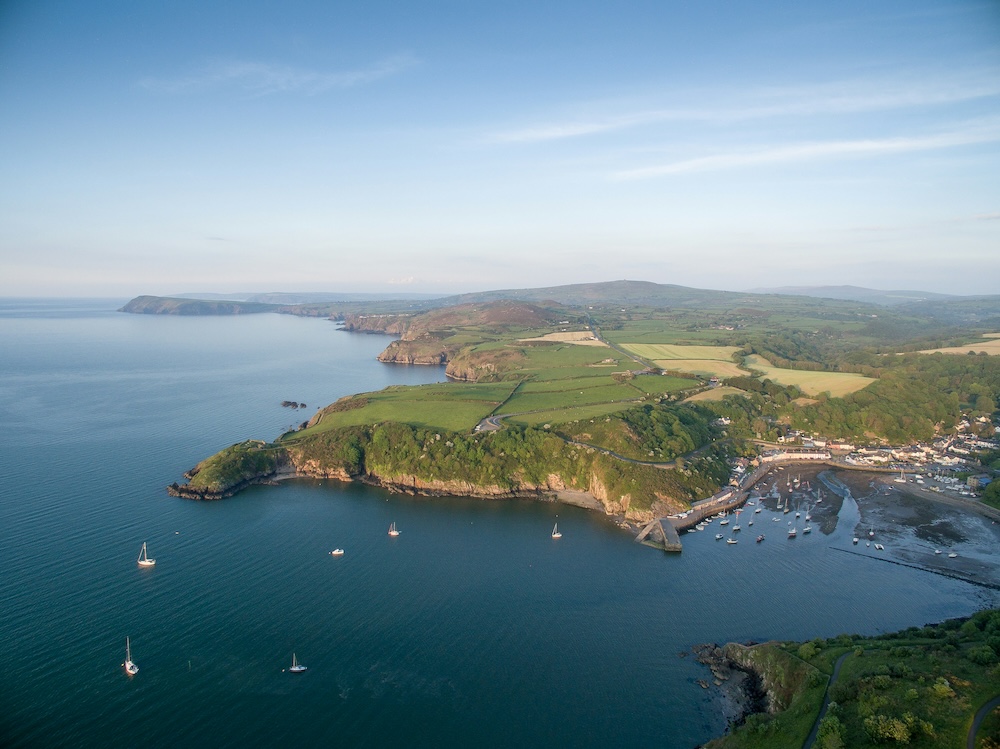Jeremy Martineau OBE from North Pembrokeshire Trade and Tourism takes a stroll through Fishguard reflecting on the town as an important cultural and tourism centre for West Wales.
Fishguard and Goodwick is in the far west of South Wales, closer to Ireland than to Cardiff. Fishguard is used in this article for the full name of this delightful place nestled on either side of Fishguard Bay: while the Port is situated in Goodwick, it is commonly referred to as Fishguard.
Nestled at the heart of, but not included in, the Pembrokeshire Coast National Park, Fishguard is a hidden gem waiting to be explored, offering stunning coastal landscapes, rich history, and a vibrant community spirit that is often overshadowed by its more famous neighbours.
Local people express the feeling that it is a place ignored by the media, Welsh Government and even our Pembrokeshire County Council. When the news in December 2024 focused on the damage to Holyhead Port, it proved difficult to persuade the media to show interest in how Fishguard Port was able to step in to provide three sailings daily: two to Dublin for both Stena and Irish Ferries as well as the usual route to Rosslare.
Fishguard Port: a gateway to Wales
Fishguard is the second largest cruise port in Wales with around 30 cruise calls every year, each with 100 to 2,500 passengers. They are welcomed by the award-winning volunteer Fishguard Friendly Faces who significantly contribute to making the town a particularly welcoming place. Fishguard Bay offers easy access from the Irish Sea, with limited docking facilities, but safe tendering and the port owners, StenaLine, provide free shuttle buses to take passengers into town where the local economy benefits from an average spend of £9 per person.
Nestled at the heart of, but not included in, the Pembrokeshire Coast National Park, Fishguard is a hidden gem waiting to be explored, offering stunning coastal landscapes, rich history, and a vibrant community spirit that is often overshadowed by its more famous neighbours.
This data was gathered in 2023 by an international intern student as part of her Masters thesis, Cruise Tourism and Sustainable Local Development: an Empirical Research in Fishguard, Wales (pp 109-117). While several Masters level interns from the tourism management department of Bergamo University, Italy, have carried out their internships with the Fishguard Chamber of Trade and Tourism, Brexit has now stopped this flow of expertise by restricting student visas.
Brexit also saw the end of EU funding for interregional projects. Three such projects were aimed at increasing international visitor numbers to this part of Wales and South East Ireland. A fourth, Celtic Routes, created a library of images and photographs, whilst Ancient Connections has the best chance of continuing to bring benefits as it created a pilgrimage route from Ferns in Ireland to St Davids.
A unique offer
While it is a challenge in Ireland to create new footpaths, we rejoice in Wales in having an abundance of public footpaths and bridleways. Our pilgrimage officer, with the British Pilgrimage Trust, continues to promote and deliver guided pilgrimages, adding value to an existing and long-standing project called Saints and Stones.
Another unique provision for cruise passengers to Fishguard (on the Grand Circle’s ship “Corinthian”) is a lunch stop at local people’s homes as their US customers want to learn about local life and culture.
Out of all perhaps, Fishguard’s best known attraction remains the Last Invasion Tapestry.
This tapestry is modelled on the more famous Bayeux Tapestry and, similarly, is an embroidery rather than a tapestry, but the name sticks. In 1797, Revolutionary France attempted to overthrow the British Monarchy, and this small scale invasion came ashore close to Fishguard and was beaten back in short order by a combination of force and farce. It is a great story with two remarkable outcomes: the creation of the local heroine Jemima Nichols who reputedly captured 12 French soldiers single handedly; and the creation of paper currency by the Bank of England as promissory notes replacing real gold and silver.
Innovative. Informed. Independent.
Your support can help us make Wales better.
Further along, adjacent to the beach is Sea Trust, a professionally run environmental body that researches and displays sea life in its aquariums. Here one of the new art creations in three art trails can be seen, which have been commissioned by our County Council using UK Government Levelling Up funds. One of the trails takes in the nearby Goodwick Moor wildlife area. Now a quiet spot, it was the location of a mediaeval battle between warring chieftains.
Other notable art can be found in Lower Town, perhaps the best known part of this attractive coastal area. Here sailing ships were once built, alongside the fishing industry that once thrived around the British coast. Well known films were shot in this area including Moby Dick, with Gregory Peck, and Under Milkwood, with Richard Burton, Elizabeth Taylor, Peter O’Toole and many locals in the cast.
Overlooking Fishguard is the community owned wind turbine, erected by local organisation Transition Bro Gwaun (TBG). The income generated is used to support other carbon reducing projects. TBG is developing a community energy scheme with the aim of making our area energy self-sufficient. TBG’s Community Pantry scheme to reduce food waste going to landfill has set a standard for others and was reported at COP21.
The world renowned Wales coastal path passes through Fishguard, with the train station being only 50m from the coastal path.
Nearby Trecwn valley was the largest ammunition depot in the UK in the 1939-45 war. Over 3000 people worked there. This underused asset is still linked by rail to the main line which connects Fishguard to London and Manchester. There is space here for significant new enterprises: the loss of employment in 1987 seriously undermined the local economy. In Goodwick, a garment making factory became too dependent on Marks & Spencer, so that when M&S switched suppliers overseas, over 60 jobs were lost. Tourism has not replaced the full-time, better paid work of those lost at Trecwn and Goodwick.
Fishguard rejoices in having two train stations – one in the port itself – Fishguard Harbour, and the other closer to the community – Fishguard and Goodwick. We are working with the Community Rail Partnership and with Visit Pembrokeshire in encouraging more visitors to come on one of the seven trains a day and use public transport or active travel to enjoy the special qualities of this wild yet safe area. The world renowned Wales coastal path passes through Fishguard, with the train station being only 50m from the coastal path.
From Fishguard Harbour station visitors can take the wildlife boat trips which offer a different way of exploring the area where the French landed in 1797, and to the remarkable seascape from Strumble Head with its lighthouse. Two tidal flows meet at Strumble Head, generating wonderful feeding opportunities for a wide variety of sea life, making this a popular location for spotting wildlife: three species of dolphin, porpoise, whales, basking sharks, bluefin tuna and a range of oceanic birdlife.
Discussions and debates that drive Wales forward.
Join Wales’ leading independent think tank.
Events
Fishguard is also becoming better known as the ‘Events Capital of West Wales’ with over 25 significant events planned for 2025. These include art, music, sport on land and sea, and our New Years Eve street party is reported to be one of the best 10 such events in the UK. (Western Telegraph, December 2024)
While the national spotlight tends to shine elsewhere, Fishguard thrives with its own unique charm, from the bustling harbour where seafarers meet to the historic streets dotted with local shops and eateries serving up fresh, regional produce. As visitors stroll along the scenic coastal paths or delve into the local heritage, they discover a warm welcome and stories that deserve to be told, highlighting the resilience and resourcefulness of a town that continues to play a vital role in the region’s connectivity and culture.
All articles published on the welsh agenda are subject to IWA’s disclaimer. If you want to support our work tackling Wales’ key challenges, consider becoming a member.




